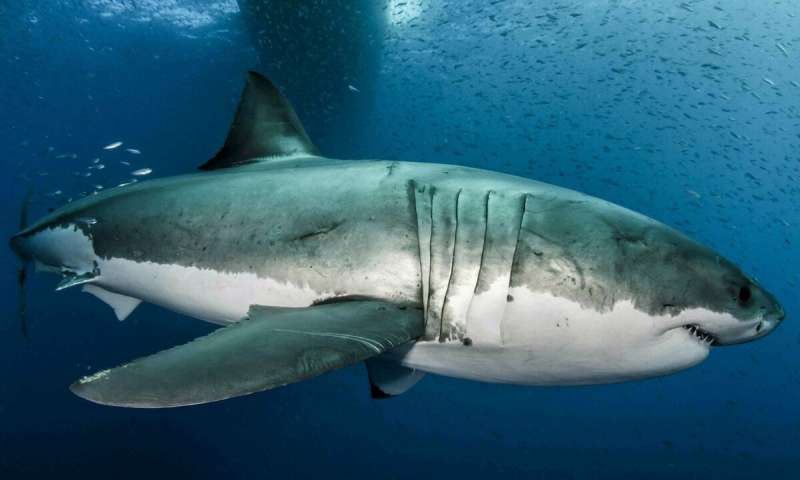Great white sharks may hold the key to discovering a cure for cancer!
Scientists have decoded the genome of the great white shark, the ultimate apex predator and the ocean's largest predatory fish. Researchers have detected numerous genetic traits that may explain the great white's incredible evolutionary success and its ability to protect itself against cancer and other age related diseases.
New research published in the
Proceedings of the National Academy of Sciences
has decoded the genome of the great white shark ( Carcharodon carcharias)
and revealedmolecular adaptations to enhance wound healing as well as genomic stability such as DNA repair and DNA damage tolerance.
The great white shark genome is one-and-a-half times bigger than that of a human and contains numerous mutations that protect it against cancer and other age-related diseases. Scientists from Nova Southeastern University (NSU), Save Our Seas Foundation Shark Research Center and Guy Harvey Research Institute (GHRI), Cornell University of Veterinary Medicine and Monterey Bay Aquarium revealed yesterday that the great white genome evolved to be stable and disease resistant and could be key in developing future treatments. They completed the white shark genome and compared it to genomes of a variety of other vertebrates, including the whale shark ( Rhincodon typus ) and humans.
Sharks evolved over 400 million years ago during the Devonian period, in comparison to the Great Apes which evolved ~20 mya, and have undergone little changes in their morphology and physiology.
Generally, large genomes with a lot of repeated DNA, like that of the great white shark, would promote a high incidence of genome instability, with much more DNA and many more cells seemingly vulnerable as targets for damage through an accumulation of routine mutations. However this is not the case with the regards to great white sharks, whose adaptations in genes have evolved to preserve genome integrity.
Molecular adaptation which is vital to protecting DNA against damage was indicated by repetitions of specific DNA sequences within the sharks genes, which were found to be linked with the repair of damaged DNA. These genetic adaptations allow the shark to maintain a stable genome.
The genome of the great white shark was also found to contain high numbers of "jumping genes", or transposons (short DNA sequences that leap from one location in the genome to another and aid in evolution).
Co- author of the new research study, Salvador Jorgensen said “Decoding the white shark genome is providing science with a new set of keys to unlock lingering mysteries about these feared and misunderstood predators – why sharks have thrived for some 500 million years, longer than almost any vertebrate on earth.”
Other mutations within the great white genome have been found to be linked to processes involved in wound healing, including blood clotting, which may explain why sharks have an impressive ability to recover from even serious injuries.
Given the fact that sharks evolved so far away from humans on the tree of life, there is a possibility that these genes represent newly discovered anti-cancer defenses. As little is known about the incidences of cancer in wild sharks, researchers will test the hypotheses under laboratory conditions by splicing genome-stabilizing shark genes into transgenic mice and then exposing the rodents to well known carcinogens, therefore allowing the measurement of the protective elements of shark DNA. This may have important implications to human medicine in the future allowing the application of gene stability in cancer patients.
Reference
:
Nicholas J. Marra el al.,(2019)"White shark genome reveals ancient elasmobranch adaptations associated with wound healing and the maintenance of genome stability," PNAS
. www.pnas.org/cgi/doi/10.1073/pnas.1819778116.
SHARE THIS ARTICLE















